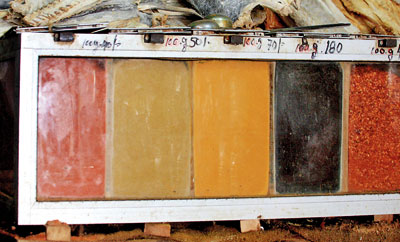News
Eateries food spiced with adulterated condiments: CMC health officials
View(s):By Mirudhula Thambiah
Adulterated and germ-infested spices are causing food contamination in eateries, Municipal health officials said last week. Food inspectors have warned several leading hotels and eateries to change their spice suppliers as their products were not produced hygienically. and their packaging not sealed properly.
When unprocessed spices are brought for processing and packing, they are not transported appropriately, said Colombo Municipal Council (CMC) Chief Medical Officer Dr. Pradeep Kariyawasam. Workers dump the spices on the ground, where they sometimes trample them and sit on them. The spices are poorly stored, before they are ground and packed for sale.

Spices for sale: Leading hotels and eateries have been asked to change their spice suppliers
“Hygiene must be observed throughout production and packaging,” he stressed. “Microbes that infect the spices cannot be seen by the naked eye, but are harmful. It is the duty of the manufacturers to protect the health of the consumers.”
Health officials said manufacturers should insist on their employees wearing gloves and masks while packing powdered spices. Meanwhile, CMC food inspectors found adulterated curry, turmeric and chillie powders at the Manning Market in Pettah, where a large number of consumers buy their food. The detections were made during raids at the end of January.
“Spices were stored in unclean conditions, prompting officers to collect samples for medical tests, said CMC food inspector Lal Kumara. Some stocks of chillie and turmeric were not their natural colour.
“As we had suspected, reports by our city analyst proved that these spices were contaminated, while most of them were adulterated,” Mr. Kumara said. “Legal proceedings have been instituted against the sellers.”
Adulteration occurs mostly in chillie, turmeric and pepper. Red salt or brick powder is mixed with chillie. Synthetic colour such as metanil yellow is added to turmeric. With pepper, its oil is extracted and only the corn is ground. Some 400 kg of adulterated pepper was recently detected in Dam Street, Colombo, by food inspectors.
There have also been instances of producers adding starch to all spice powders, to increase their weight. These practices are a violation of the Food Act. Mr. Kumara said adulteration mostly occurred in the Colombo suburbs where grinding mills are situated.
Colombo City Analyst B. Rajanayake advised consumers to be vigilant when buying spices from wayside shops. He suggested that they use the products of suitable manufacturing companies. “I also advise consumers to taste the spices where they can, before buying them,” he said. As producers are only profit oriented, they mislead consumers. Sometimes, salt powder is added to spices to increase the weight, as salt is cheaper than spices.”
He said, he recently came across incidents of excessive moisture in spices and other foods. He also warned that metanil yellow in turmeric powder was carcinogenic.
“The number of adulteration cases declined following the deployment of 1,500 authorised food inspectors around the country, said Food Control Unit Assistant Director S. Thilakaratne. Nevertheless, surveillance was an ongoing process. In 2012, 174 cases of poor quality or adulterated spices were detected by the CMC.
Follow @timesonlinelk
comments powered by Disqus


















